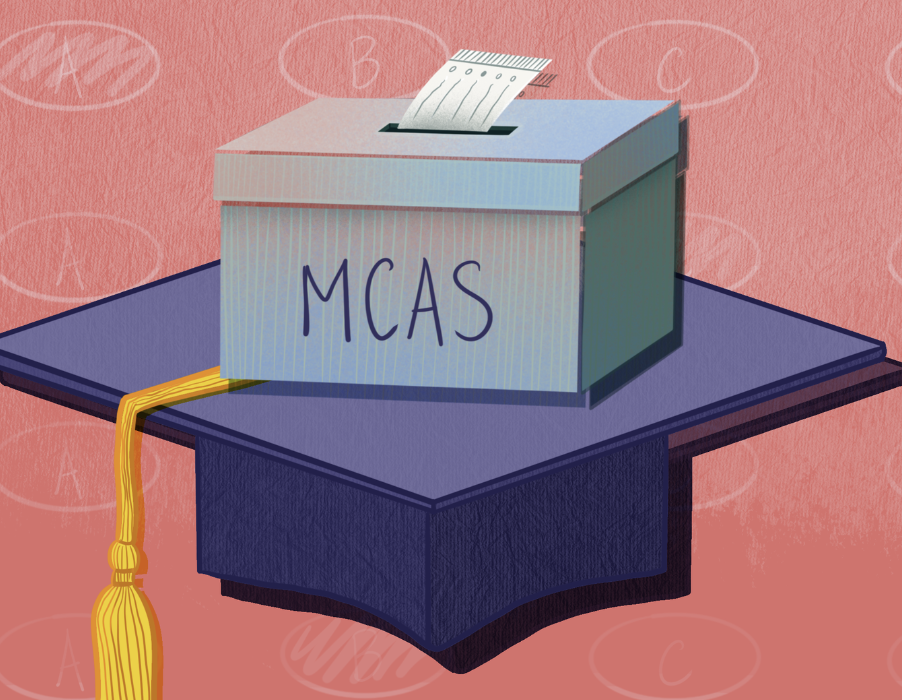MCAS TEST: YES or NO?
This is what the voters would decide on November 5th. Are you ready to decide for the future of education?
MCAS, the Massachusetts Comprehensive Assessment System, is a set of statewide standardized tests, required in the high school to earn graduate.
Voting “Yes” means that Massachusetts will become one of many other states where passing a standardized test is NOT required to graduate. Without the statewide graduation requirements, each of the Massachusetts districts may have to establish and meet their own graduation standards. On the other hand, voting “No” means that nothing changed, and that MCAS test will remain a compulsory requirement for graduation.
For students, this vote can be life-changing. Many students struggle with the state test, while others find it an unnecessary nuisance. Most students however, cannot vote.
For teachers who can vote, this choice is extremely difficult.
Some teachers such as Ms. Bishop will be voting ”No” on Question 2. Others like Ms. Weinsaft, will be voting “Yes.”
The reasons behind these choices vary.
The Case for a “No” Vote
“I will be voting no, but it is a painful choice as there are very few people in this building that hate the MCAS exam more than I do,” says Ms. Bishop, English teacher. “Currently, 40% of a school’s accountability depends on the MCAS exam.” Accountability, as Ms. Bishop explains, determines our school’s level, with 1 being the best and 5 being the worst. South is currently at level 4. “The worse the level, the less funds a school receives. While Question 2 will remove MCAS as a graduation requirement, it will not remove it as an accountability measure, and the MCAS exam is the largest percentage of a school’s accountability.”
If the accountability level drops to a 5, the state government takes control of the school and replaces the existing staff with their own. “This happened to Southbridge back in 2016.” Ms. Bishop says. “To this day, Southbridge is still under state control, and even though the town wants control of its school back, the state refuses to allow it for at least a few more years.”
The Case for a “Yes” Vote
Ms. Weinsaft, history teacher, states: “I will personally be voting yes on [question] two because I think that the history of standardized testing is based on racism and eugenics [and] standardized testing is not a very powerful tool for assessment, especially because the way that the data works for MCAS is not really designed to test for the information it is used for.”
Continuing on, Ms. Weinsaft cites the fact that the test has little data that can be used effectively. “To punish students directly for a bad test seems wrong. There are ways to use the data to [improve] your teaching but that’s not what MCAS does. We get the scores back a year and a half after those students have left our classroom. It is just a test of how well you understand English and how well you can use a computer.”
The Issue of School Funding
Despite their differences in responses, both teachers are concerned about the same thing: school funding. “Ultimately, what is sad is that the standardized testing will still be tied to school funding” says Ms. Weinsaft. “So making sure students still show up and try their best is still going to be important for the school to make sure that we can still offer all the good classes and all the fun stuff that we want to do.”
Ms. Bishop says that if Question 2 was altered to be the removal of the state test being a graduation requirement and an accountability measure, then she would vote yes. “As it stands, the teacher’s union hasn’t proposed another option for accountability and the state plans on raising the number of points required to pass the exam in 2026.”
Despite the fact that the teachers are voting differently, they agree on the need for students to take MCAS seriously because of its effect on our school’s overall success. “[Its] another really significant problem with how our education system is funded, sadly.” Ms. Weinsaft says. “So I hope that students will understand the importance of coming and trying their best on the test. Hopefully it makes a student’s life a little bit less stressful and a little bit easier to make it through high school because there are still a lot of really high standards that students need to meet in order to graduate.”
While many of the students at South High are not old enough to vote yet, we will all be affected by the outcome of this Ballot Question. It is important to be informed and when the time comes, to get out and VOTE.







